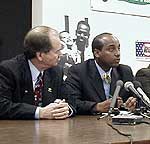By Dan Olson
Minnesota Public Radio
March 21, 2002
Confrontration over the police killing in Minneapolis last week of an armed, mentally ill Somali man has turned into pledges of cooperation. A Somali spokesman joined Minneapolis Police Chief Robert Olson Wednesday, in promising to repair relations strained by the shooting of Abu Kassim Jeilani.
| |
|
|
|
||
Relations between Minneapolis police and many of the city's Somali residents have been strained in the week since officers killed Abu Kassim Jeilani. So it was a noticeable sign of improvement when Minneapolis Police Chief Robert Olson accepted the invitation of Omar Jamal, director of the Somali Justice Advocacy Center, to visit the group's St. Paul office.
As the two spoke to reporters, Jamal said his organization will work with police to improve relations.
"We very much appreciate the job the average police force do to keep the citizens and us safe in this state, which involves daily danger in any given situation." says Jamal. "But at the same time, we want to make sure everything is done according to the Constitution of the land, and nobody is above the Constitution."
Jamal repudiated statements he made in the days immediately following the shooting, when he described Minneapolis as a slaughterhouse for immigrants, and called for Chief Olson's resignation.
"There was tremendous outpouring of emotions and frustrations, given what happened at the time. A lot of things had been said. Later, after reflection, we...met with the chief and the mayor. And now I would fully say I'd like to work with the chief and have him there," Jamal said.
Six Minneapolis police officers fired as many as 15 rounds into Jeilani, a married father of two children. He was carrying a machete and a crowbar as he crossed a street near the Chicago Crossings shopping center at Franklin and Chicago in south Minneapolis. In a 10-to-15 minute confrontation, police were unsuccessful in using a Taser, or electrical stunning device, to subdue Jeilani.
Minneapolis police also have shotguns that fire bean bags to knock people down, but Chief Olson says none were available at the time. He says the department is buying more.
|
"There was tremendous outpouring of emotions and frustrations, given what happened at the time. After reflection...I'd like to work with the chief and have him there."
- Somali leader Omar Jamal, on his earlier call for Chief Olson's resignation |
"That doesn't mean this would have been some kind of a magic thing that could have solved the problem. But it's another tool that we clearly are going to be putting in to help out," Olson said.
Police have been criticized for not using Somali-speaking bystanders, who volunteered to try talk with with Jeilani in his own language. Olson says police policy doesn't permit it.
"When we don't have a situation under control, and we have someone with a weapon, we will not let just the average citizen get anywhere near it. They wouldn't do that as a normal course," he said.
Olson said a police department employee who speaks Somali was called to the scene, but arrived too late to help. The department has no Somali-speaking officers. Olson said he'll try recruit potential candidates.
"We send them to school and pay their tuition, and when that's finished then they can come right on the force. We put them in the academy, and they pledged to work with me to diversify the force with getting more Somali officers," Olson said.
Somalis cite the killing of Jeilani as the latest in a set of police confrontations. Olson pledged cooperation to improve relations. However, he also defended police behavior. He said officers newly-trained in crisis intervention have gotten people to emergency rooms or other help, in situations that could have escalated to deadly encounters.
"Since August, our field officers have taken over 1,000 people to crisis. Just in the week after this terrible incident- in the last five days, they've taken 18 people into crisis," Olson said.
Police have turned over the investigation of Abu Kassim Jeilani's killing to the Hennepin County Sheriff's office. Somali supporters will hold a prayer vigil on Friday, and a march from the scene of the shooting to City Hall on Saturday.
More from MPR
